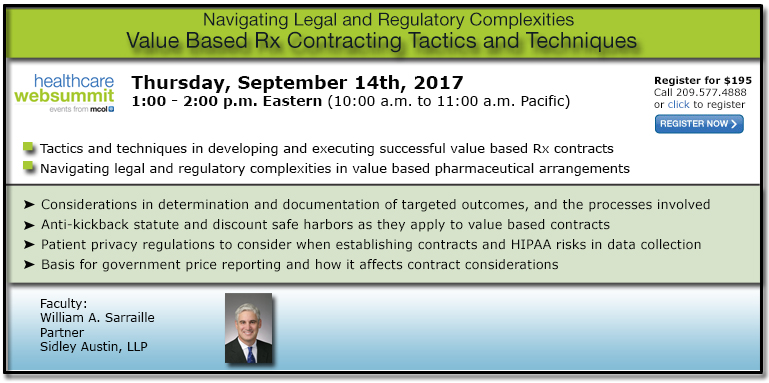

Click here
to view this message in a web browser
 |
||
| Value Based Rx Contracting Tactics and Techniques: Navigating Legal and Regulatory Complexities | ||
|
Value-based
pharmaceutical contracts, sometimes referred to as risk sharing
agreements between pharmaceutical manufacturers and health plans or
other purchasers are critical in today’s very complex and costly
healthcare marketplace. These agreements allow placement of high-risk,
high-cost and often times specialty pharmaceutical products onto
purchaser formularies through basing payment on outcomes as opposed to
volume metrics. The concept has become popular in single payor systems,
and is beginning to take flight in the U.S. as evidenced by several high
profile value based contracts between pharmaceutical manufacturers and
health plans. However, as with every new concept in the U.S. health care
arena, there are growing pains, fear and uncertainty. In order to establish a value-based contract, pharmaceutical manufacturers as well as purchasers must understand the complexity of these agreements and the legal implications associated with it. Manufacturers will need to ensure safe harbor protection under the Anti-Kickback Statute to enter qualified value based contracts. As there is a greater exchange of more data between stakeholders, manufacturers must mitigate HIPAA risks including reporting of adverse events and sharing of patient data. They must also understand the legal regulations necessary to take into account within value based contracts. Special concerns must be addressed in pharmaceutical value based agreements with non-traditional purchasers such as hospitals, hospital systems, integrated delivery networks (IDNs) and ACOs. These challenges include rebates and government programs, and incorporating provisions in regard to these agreements to compliantly address best price calculations. Please join us Thursday, September 14, 2017 at 1 PM Eastern as Sidley Austin's William A. Sarraille discusses trends; alternative structures; legal and compliance issues; network features, benefits and disadvantages; and current examples around the country. Click here for detailed information and to register or call 209.577.4888. |
||
|
|
||
|
healthexecwire |